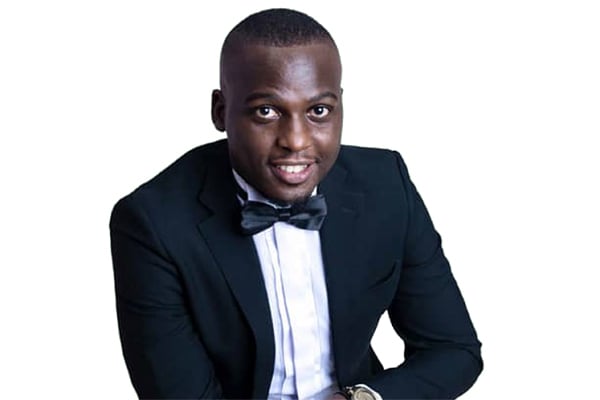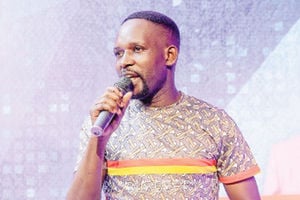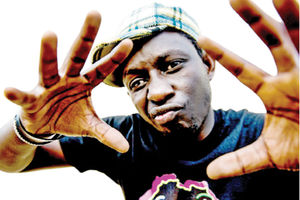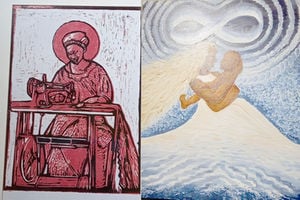
Besides playing instruments, Steve Keys is also a writer, cricketer and played basketball. PHOTO| COURTESY | STEVE KEYS
How were you introduced to music?
There was a church in Seguku where my father was an elder and one of the other elders had a toy keyboard he used to come with to church. It was the first keyboard I saw and it interested me. I was about six years old and sometimes he allowed me to play with it.
But one of the life-changing things with music is that my dad is an electrical engineer who used to fix electronics so one time someone brought home a big broken keyboard for him to fix.
He fixed it and the owner took about a year to pick it. I learnt that it was from a Catholic Church, which had decided to buy a new one. I started learning to play on that keyboard, which changed my life.
Tell me about the transition from church boy to a secular musician…
I find myself hesitant to use the word secular but in 2011 a friend called Abraham introduced me to Janzi Band. By then, I was playing the piano at Watoto Church and he used to play the bass guitar and drums. Janzi Band was trying to regroup and had no keyboard player and he said there was an opportunity for us to go and make some money.
It was a very unfamiliar territory for me. I was not used to playing that kind of music or listening to it. If was not listening to gospel music, it was Rn’B and I was a fan of Boyz II Men in particular.
I joined the band, played music and stayed for about two years as a keyboardist for the first year then in my second year I started playing while singing.
Where did you go after leaving Janzi Band?
In 2013 I approached an Italian lady who used to run Gatto Matto in Bugolobi and I asked her to allow me play a night there, so she told me Friday was taken. I preferred Tuesday and she was hesitant, arguing that it was too early in the week.
I pleaded with her to let me do it without paying me much. Surprisingly I ended up doing it for five years and only missed twice. My biggest memory there was on an evening when it drizzled. Gatto Matto was an open place with umbrellas but the revellers kept on watching us.
You are a music producer at Swangz Avenue, when did you join the team there and what mark have you made?
I have been producing music for church choirs but commercially, I started producing music for Swangz Avenue in 2021. They took a risk on me. They never knew of any music I had produced but brought me on board as a music producer.
They knew I could play instruments. My greatest achievement has been mixing Azawi’s album, African Music and the biggest compliment I got from social media is that it sounds really good.
Since then, I have been working with different musicians, recording, mixing and mastering for them. Most of them do not even know that I can sing or play instruments but when they show up at weddings where I play, they get surprised.
Which musicians have you worked with?
I do not know whether I am allowed to say but the ones you know are Winnie Nwagi, and Vinka, but those are Swangz so it is part of my Job Description to work with them. I am working on some music with Juliana Kanyomozi. I have worked with Myco Ouma, Irene Namubiru, John Blaq, A Pass, and many others.

Besides playing instruments, Steve Keys is also a writer, cricketer and played basketball. PHOTO| COURTESY | STEVE KEYS
Do you define yourself as a producer or a creative?
I see myself as a creative. There are a lot of things people do not know about me. I am a public speaker. Between 2007 and 2009 I was a preacher. I travelled to South Africa, Liberia, Zimbabwe, Zambia, Ghana and Nairobi on engagements to speak to university students. Many people do not know that I can sing. Just go to streaming platforms and look for Steve Keys.
You have made hit songs for artistes, when are you producing yours?
When I am producing music, I do not think about hits. I focus more on communication. I like speaking out my heart and mind in my music. I have a song called Yeggwe.
One time I was at Cricket Oval and a gentleman told me one of my songs changed his life. He said he was on the verge of divorcing his wife but that song saved their marriage. He did not know the title of the song but played it from his phone. For me, that is a great achievement.
Many people do not know me as a writer but I write music. People do not know that I played cricket at national level when I was at Ndejje Senior Secondary School. I played basketball and I have what people call a championship with City Oilers.
Which of your songs is on rotation?
There is a song called Don’t Try to Change Me mostly played on Sanyu FM. I sent it to Tshaka Mayanja, he listened to it, called Sanyu FM and asked them to play it. That is how I was introduced to Sanyu FM.
What is your view on the economics of music in Uganda?
I do not want to sound political but I think there is no procedure and if it is there, it is money for people to get their music played. It is very hard to become rich by recording and writing music.
Much of the money artistes make here is from live performances but in first-world countries, people make money as songwriters, session instrument players, and movie scores. We are not yet there but my prayer is that our industry grows so that many people can earn a living in many other ways apart from stage performances.
Is our music quality getting better?
It is. When you listen to the music of 2000 and compare to now, you see it is much better with technology and skills. I know we still have bedroom studios but the world has become more accepting that your music might be crappy but people will pick what is good, for example, the message and appreciate that but back then, your music simply had to be good.
What does an artist such as Gravity Omutujju whose music borders profanity, communicate in filling up Lugogo Cricket Oval?
The scope of this industry has become wider. The space has been opened up. People will look for something that makes them feel good from whatever you bring and they will pay for that to the point of filling up Lugogo.
Who are those artistes you rate as gifted?
There are so many. I am scared of mentioning names because I might not say some, but I rate Anknown, Kamanzi, Kohen Jayce, Zuli Tums, Mercy Bello, and Tonia, who has been working with Tshaka Mayanja. The one who has broken through is Azawi.
What makes you tick in the area of sound and production?
The biggest thing is mixing and mastering. I have to make sure that when an Azawi song is played amidst Nigerian or American songs, it does not sound off but is up to quality. That is the gist of my job.
You are self-taught; how do you do it all?
I have never been to a music school. I have taught myself how to play the piano, and sing by listening to my favourite singers; Boyz II Men, Brian McKnight, Joe, and gospel artistes whom I try to mimic to become better.
The first time I looked at a computer was when my friend Wasswa had a studio in his house.
He was going to the UK for three years and wanted to leave it with someone. I volunteered to keep it and I spent a lot of time on YouTube in try and error to learn how to record. That is how I learnt how to record.
Around the time, 2010, I dated a girl who had a faulty laptop, and I asked her to give it to me. I had a friend, David, who used to fix laptops. He fixed it and it became my laptop and I used it to record.
In 2020, during lockdown, is when I had my greatest transformation. I spent that whole year on YouTube teaching myself how to mix. My big question was why music sounded different.
The Internet ate my money because I was buying professional software to teach myself how to master and mix music and by the time I joined Swangz Avenue in 2021, I was a different man. When Azawi’s album came out, people appreciated it and since then the rest is history.
You are one of the common faces on the Tusker Malt Conversessions, what is your role there?
Since Swangz is a company that does the Tusker Malt Conversessions, as a sound engineer, I record and mix all the episodes you have watched.
What is on your wish list?
To get married and have children (I am joking). My singing side has been in the background a little bit but now I want to make my music more vibrant and also have performances.
I want to travel the world, meet people, and work with big artistes. I do not set the limit. I want to experience what it is like to go to 50 cities in a year, what it feels like to produce a song for Rihanna or have a studio session with Burna Boy or perform on the same stage with John Meyer.
TO YOUNG CREATIVES
Give 100% and be consistent. Some doors look like opportunities but are really obstacles.
When you are young, you want to try many things but focus on one that you feel gives you peace. By the time you grow older, you will have a lot of experience and connections. Recognise the best in you and think of how to earn from it.





